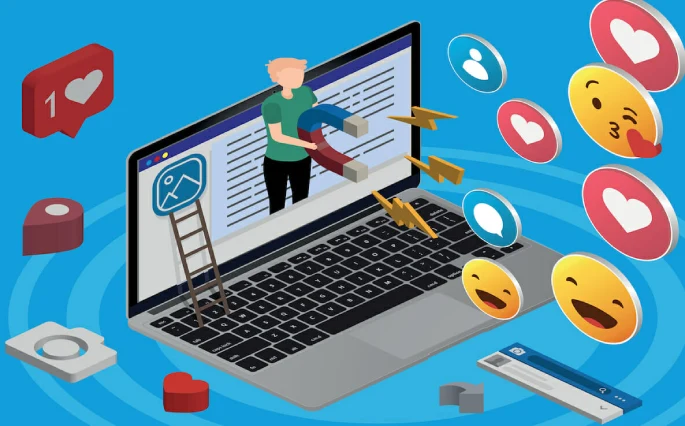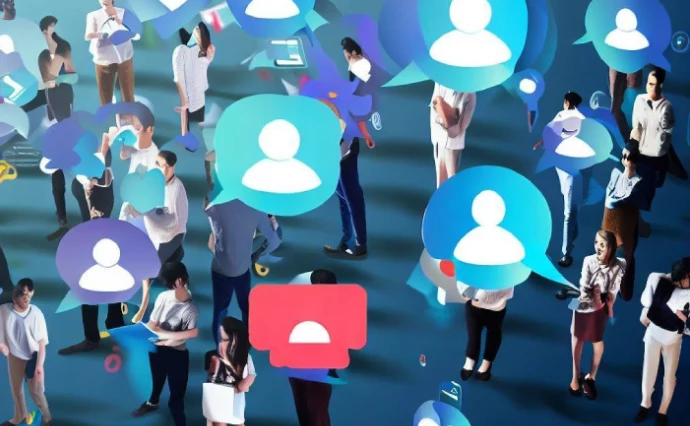The Impact of Social Media
The impact of social media is profound and far-reaching in today’s digital world. It influences how we communicate, learn, and even view ourselves. With platforms like Instagram, TikTok, and Facebook becoming integral parts of daily life, understanding the impact of social media is crucial. Social media has revolutionized the way we interact with friends and family, offering instant connectivity and a platform for sharing moments and ideas.
However, the impact of social media is not entirely positive. While it brings many benefits, such as enhancing communication and providing educational resources, it also poses challenges. Issues like cyberbullying, privacy concerns, and the effects on self-esteem highlight the need for a balanced approach. By exploring both the positive and negative aspects, we can better navigate the digital landscape and harness the power of social media wisely.
How Social Media Influences Communication
First, social media changes how we talk to each other. Instead of face-to-face conversations, we now use text, emojis, and video calls. These platforms make it easy to stay in touch with friends and family. However, they also change how we interact. We might miss out on the tone and emotions behind messages. For instance, a joke might be misunderstood if not delivered in person. Therefore, while social media helps us connect, it can also lead to misunderstandings.
The Role of Social Media in Education
In addition to communication, social media influences education. Many students use it for research and to share their work. Platforms like YouTube offer tutorials on almost any subject. Also, educational groups and forums help students discuss and solve problems together. However, there is a downside. Sometimes, students might rely too much on these platforms and not check the information’s accuracy. Thus, it’s essential to verify facts before trusting them.

Social Media and Self-Esteem
Social media can also impact how we feel about ourselves. Platforms like Instagram and Tikor often show idealized images of people and lifestyles. These perfect pictures can make us feel like we don’t measure up. It’s important to remember that many images are edited or carefully chosen. Real life is not always as polished as it appears online. Therefore, it’s crucial to focus on our own strengths and not compare ourselves to unrealistic standards.
The Risks of Social Media
Despite its benefits, social media has risks. For example, cyberbullying is a serious issue that affects many young people. Bullies might use social media to harass others, causing emotional harm. Additionally, sharing too much personal information online can lead to privacy problems. It’s important to be cautious about what we post and who we interact with online. By setting privacy settings and being aware of our online presence, we can protect ourselves.
How to Use Social Media Wisely
To get the most out of social media, it’s essential to use it wisely. First, balance your online time with offline activities. Spending too much time online can lead to issues like eye strain or poor sleep. Moreover, use social media to stay informed and inspired, but not as your only source of information. Always check multiple sources before accepting information as true. Additionally, engage in positive interactions and support others online. This approach helps build a healthy online community.
The Positive Effects of Social Media
On the bright side, social media has many positive effects. For instance, it helps people stay connected with loved ones, no matter the distance. Whether it’s through sharing updates or participating in group chats, social media keeps relationships strong. Additionally, it can foster communities around shared interests and causes. Many people find support and friendship through online groups related to hobbies, health, or personal goals. Thus, while social media has its challenges, it also offers valuable opportunities for connection and support.
Social Media and Creativity
Furthermore, social media can be a great platform for creativity. Many artists, writers, and musicians use these platforms to showcase their work. They can share their creations with a global audience and receive feedback. This exposure can lead to new opportunities and collaborations. Social media platforms also provide tools and resources that help users develop their skills. For example, tutorials and creative challenges encourage learning and improvement. Hence, social media can be a powerful tool for fostering creativity and self-expression.
Balancing Online and Offline Life
Maintaining a balance between online and offline life is crucial. Social media can be fun and engaging, but it’s important not to let it dominate your time. Try setting limits on how much time you spend on social media each day. Engaging in physical activities, hobbies, and spending time with family and friends offline is equally important. These activities help maintain a healthy lifestyle and provide a break from screens. Thus, balancing online and offline activities ensures a well-rounded and fulfilling life.
The Future of Social Media
Looking ahead, social media will continue to evolve. New technologies and platforms will change how we interact online. It’s important to stay informed about these changes and adapt accordingly. Future developments might include more immersive experiences, like virtual reality interactions. As social media evolves, it will bring both new opportunities and challenges. Staying aware of these trends can help us navigate the digital world more effectively. Therefore, keeping up with technological advancements will be beneficial in making the most of social media.
FAQ
Q: How has social media changed the way news is reported?
Social media has transformed news reporting by enabling real-time updates and allowing a broader range of voices to contribute to news coverage. Journalists now use social media to quickly share information, interact with audiences, and gather user-generated content.
Q: What are the primary challenges journalists face with social media?
Key challenges include dealing with the speed of information dissemination, managing the spread of misinformation, and balancing the need for rapid reporting with maintaining accuracy and journalistic integrity.
Q: How does social media affect the credibility of news?
Social media can impact news credibility by facilitating the spread of misinformation and unverified content. The lack of rigorous editorial standards on these platforms can lead to the dissemination of false or misleading information.
Q: What role do algorithms play in shaping news consumption on social media?
Algorithms curate and prioritize news content based on user engagement, interests, and social connections. This can lead to personalized news feeds that may reinforce existing biases and limit exposure to diverse viewpoints.
Q: How has citizen journalism influenced traditional media practices?
Citizen journalism has influenced traditional media by introducing diverse perspectives and real-time updates. It has prompted news organizations to adapt their practices, often incorporating user-generated content and engaging more directly with audiences.
Q: What strategies can journalists use to combat misinformation on social media?
Journalists can combat misinformation by employing fact-checking methods, collaborating with verification organizations, and educating the public about media literacy. They can also use social media tools to trace and correct false information.
Q: What future trends might shape the relationship between social media and journalism?
Future trends may include advancements in artificial intelligence for news verification, increased emphasis on digital media literacy, and the development of new technologies to enhance content authenticity and combat misinformation.
Q: What is the impact of social media on communication?
The impact of social media on communication is significant. It allows us to stay connected with friends and family instantly, regardless of distance. However, it can also lead to misunderstandings and reduce face-to-face interactions. Social media often lacks the emotional nuances of in-person conversations, which can affect how messages are interpreted.
Q: How does social media affect self-esteem?
Social media can impact self-esteem in both positive and negative ways. On the positive side, it can provide support and encouragement from friends and communities. On the negative side, it often presents idealized images and lifestyles that can lead to unrealistic comparisons and lower self-esteem. It’s important to be aware of how social media affects you personally and to focus on real-life achievements and relationships.
What are some risks of using social media?
Social media poses several risks, including cyberbullying, privacy issues, and potential exposure to misleading information. Cyberbullying involves harassment or negative behavior online, which can harm mental health. Privacy concerns arise when personal information is shared too openly. Additionally, misinformation can spread quickly on social media, so it’s crucial to verify information from reliable sources before accepting it as true.
Conclusion: Embracing the Digital Age
In summary, social media plays a significant role in modern life. It influences communication, education, self-esteem, and creativity. While it has many benefits, it’s essential to be mindful of its potential drawbacks and use it wisely. By maintaining a healthy balance between online and offline activities, and staying informed about new developments, we can enjoy the positive aspects of social media while mitigating its risks. Embracing the digital age with a thoughtful approach ensures we can benefit from the connections and opportunities that social media offers.
Social media has a significant impact on how we communicate, learn, and feel about ourselves. While it offers many advantages, it’s essential to be aware of its potential downsides. By using social media wisely and being cautious about our online interactions, we can enjoy its benefits while minimizing risks. Always remember to stay true to yourself and not let online content dictate your self-worth
